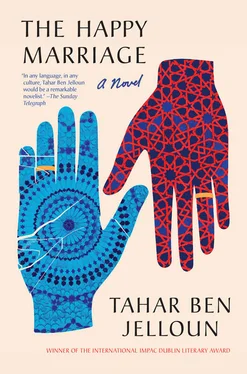When he’d come to the clinic, a few days following his stroke, and when they’d brought him up to speed on his condition, he’d suddenly remembered what his mother had feared the most: becoming an object, like a pile of sand or rocks that had been dumped on one of the corners of life and was completely dependent on others. Happily, once he’d returned to his house, he’d been able to hire the Twins to help bear the burden of this new and unpredictable situation he was in. Being able to wash himself, or shave, wipe, dress, while still retaining some of his natural elegance, hanging on to his dignity and affability, that’s what lay on the horizon for him. The time of impulses and desires had drawn to an end. He could no longer satisfy his sudden urges for steak tartare at a restaurant. Could no longer go out for a morning stroll to stay in shape. Could no longer visit the Louvre, the Prado or the pretty galleries in the 6th arrondissement. Could no longer dive into new dalliances, or rendezvous with new beautiful women, or have romantic dinners in Rome or elsewhere, could no longer make impromptu visits to his old friend, the antique dealer, with whom he loved to visit Parisian markets. All of these things — and many others besides — had now become impossible. He had lost his inner lightness. Now he was no longer the sole master of his life, his movements, his desires or his moods. He relied on others. For everything. Even to drink a glass of water or to sit on the toilet seat to do his business. His reaction to that was immediate, he just became constipated. He would hold it in and delay his bowel movements as long as he could. That his bowel movements were few and far between partly encouraged that approach. “Shit betrays us,” he told himself. His mother had become incontinent; she would refuse to wear diapers and would then shit herself, just like a baby. His mother would stink of shit and yet he would still lean down and kiss her. Then he would call the nurses over so they could clean her up, while he would go out into the corridor to weep in silence. When your life is in someone else’s hands, is it still really a life?
“Illusion travels by streetcar!” An inner voice often murmured that sentence. It reminded him of something else, but he couldn’t put his finger on it. All of a sudden, as though in a flash, he saw a beautiful brunette with her hair combed in the 1950s style. She was sitting down and was propping her cheek up with her right hand, while her left lay on a man’s shoulder. The man had a pitiful look to him and his arms were crossed, and his shirt collar was unbuttoned despite the fact that he was wearing a tie. It was a black-and-white image. Then, as though in a dream, he suddenly recalled the woman’s name: Lillia Prado. It shone out of his memory’s murkiness. Lillia Prado! But who was she? Where had she come from? He recalled an old Algerian friend who shared the same name, but who looked nothing like this Lillia. And besides, why did illusions travel by streetcar? He asked himself that question several times and then the name Luis Buñuel rose out of his innermost depths. The sentence that had come to him was in fact the title of a film shot in 1953 by the filmmaker when he’d started living in Mexico after fleeing Franco’s Spain. The title the French producers had chosen —On a volé un tram ( A Tram Was Stolen ) — was ridiculous. They had stripped it of all its poetry and mystery. He was pleased to have solved that conundrum, it was a sign that his memory was starting to work once again.
If a man and a woman are two halves of an apple, then two men are quite often two halves of a couple.
— SACHA GUITRY, Nine Bachelors
By the mid-1980s, the painter still hadn’t put down roots anywhere. He never kept the same studio for more than a few months, traveled without any luggage, and most of the time he’d been happy to work with only a notebook and pencils for his sketches. His first meeting with his future wife had utterly changed everything. A week after their first kiss, he’d decided to spend less time in his studio and to devote it to her instead, and they exchanged vows and swore to keep them a month later. Those who knew them best couldn’t believe their eyes. The painter had been able to guess what his friends must have said about him when they crossed paths in Paris: “She’s too young for him, and too pretty too!”
They had been wrong to bad-mouth them, because throughout the first two long, pleasant years of their married life, the painter and his wife were the happiest couple in the world. She’d known how to keep him happy, had quickly learned how to adapt to his mannerisms, habits, and whims. She had accepted them with a smile and would sometimes even mock him a little about them. There had been no conflicts of any kind. “Not a cloud in the sky,” she would say with a smile.
He had rented a little house for her on Rue de la Butteaux-Cailles. It was a charming place: one would have thought that it was in the middle of the open countryside instead of smack in the center of Paris. They led a smooth life that was completely devoid of conflict. He still looked back on those days with a deeply felt and sincere nostalgia. His wife had been very loving then and had thrown herself into their conjugal life with a great deal of intensity. They hadn’t gone on a honeymoon, but they had decided that she would accompany him wherever he was invited: exhibitions, symposiums, or contemporary art fairs. They always extended their visits by a few days in order to properly visit the country, guidebooks in hand. The painter, who’d already traveled a great deal, had found it very moving to introduce his wife to the great cities of the world: Venice, Rome, Madrid, Prague, Istanbul, New York, then San Francisco, Rio de Janeiro, Bahia … She would buy him everything that he liked and always brought presents back for his family. The painter, for his part, spared no expense. On their return to Paris, she would call her friends and relatives and tell them about their wonderful journeys down to the slightest detail. She would humbly tell them that she felt blessed to have such opportunities. When she would hang up, she would whisper in his ear: “You know, I’m the one who was lucky to have met you!” He thought that marrying a twenty-four-year-old woman had been something exceptional for a thirty-eight-year-old man, a privilege reserved for a select few. In his mind, never being like anyone else had always seemed like a guarantee of eternal happiness. And then, he’d thought, the time had come to settle down, start a family, and change the rhythm of his life. She was the ideal woman for that new life.
They made love often, and it was tender and natural. He would occasionally wish that she could get a little more involved in the act, but she would laugh and make him understand that she was too bashful for that. One evening, when they’d been changing channels on the television late at night, they’d stumbled onto a porno. She’d cried out, horrified by the spectacle of those unrestrained women and men with huge penises. Shocked, she had snuggled against him as though wanting him to protect her from some imminent danger. She’d never seen a porno in her life. He had reassured her, telling her that those films were transgressive and outrageous, and that most people’s sexuality was rather simple. Then she’d regained her composure. At which point he’d switched the television off and they fell asleep on the living room sofa, their bodies entwined.
One day, she took the train to go see her parents, who lived on the outskirts of Clermont-Ferrand. She had asked him if he could help buy her ticket, and told him she also wanted to bring her parents a few small presents. He’d given her all she’d asked for and told her that they would open a joint bank account that very afternoon so she would never have to ask him for money again. She’d been very happy to hear this and he’d told her that everything that was his also belonged to her, and vice versa. He’d laughed, happy at how perfect their arrangement was.
Читать дальше












